
Film Music Editor: Ian Lace |
||
 |
September 1999 Film Music CD
Reviews |
|
![]() COMPETITION WIN
a CD of your Choice
COMPETITION WIN
a CD of your Choice
![]()
Return to the September (2) Index
____________________________________________________________________
SCIENCE FICTION REVIEWS FEATURE____________________________________________________________________
Collection: The Best of Star Trek MILAN 65245-2 [72:06]
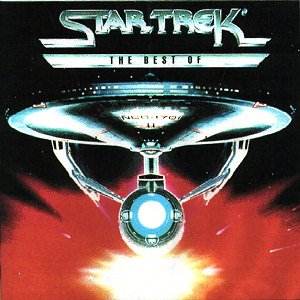
- Music by:-
Jerry GOLDSMITH (Star Trek; Star Trek V)
James HORNER (Star Trek II and III)
Leonard ROSENMAN (Star Trek IV)
Star Trek: The Motion Picture - The Meld; Ilia's Theme; The Enterprise.
Star Trek II: The Wrath of Khan - Battle in the Mutara Nebula; Enterprise Clears Moorings; Genesis Countdown.
Star Trek III: The Search for Spock - Returning to Vulcan; Prologue and Maion Title The Katra Ritual
Star Trek IV: The Voyage Home - Chekov's Run; Hospital Chase; Home Again The Whaler
Star Trek V: The Final Frontier - Life is a Dream; Without Help; An Angry GodI detail above the 16-track contents of this album (including the full names of the films which the Milan booklet editors have overlooked). Trekers will no doubt salivate. This is an excellent sampler, in first rate sound, assembled to celebrate the 25th Anniversary of Star Trek.
The track listing speaks for itself to the enthusiasts, but I would just mention a few tracks from each of the three composers. Clearly all three celebrate the sweep and grandeur of the heroic exploits of the crews of the Enterprise through the immensities of time and space.
Of Jerry Goldsmith's contributions I was captivated, in particular, by 'The Enterprise' from Star Trek: The Motion Picture. It is as though Goldsmith is serenading the elegant spaceship as though she were some beautiful woman. Ilia's theme from the same movie is a mystical and intensely Romantic, bell-like piano led piece. For 'An Angry God', Goldsmith creates poignant music that also has a cool ethereal beauty before it is jeopardised by more sinister motifs. James Horner, too, creates a feeling of grandeur and heroic expectancy around 'Enterprise Clears Moorings' from Star Trek II and another strong Romantic theme plus an air of mysticism for 'Returning to Vulcan' from Star Trek III. For the same movie, Horner adds some very exotic scoring in The Katra Ritual. This is very atmospheric and it is an impressive study in crescendo with a shattering climax before the music subsides into mystical serenity. Leonard Rosenman adds some much needed comic relief in 'Hospital Chase' plus a salty Hornpipe-like number that is 'Chekov's Run'. Some of the tracks embrace Alexander Courage's theme form the Star Trek TV series.
Reviewer
Ian Lace

Collection: This is Science Fiction 2CDs VIRGIN/EMI VTDCD 262 7243 847917 2 8

CD1
John Williams: Star Wars (Main theme); Mark Snow: The X Files (Original Main Theme); Jerry Goldsmith/Gene Roddenberry Star Trek (Main Theme); Bach Tocatta in D minor (as used in Rollerball); Richard Strauss: Also Sprach Zarathustra (as used in 2001 A Space Odyssey); Brad Fiedel: The Terminator Man (Main Title); Jerry Goldsmith: Planet of the Apes (Main Title);
Leonard Rosenman: Fantastic Voyage (theme); Jerry Goldsmith: Alien(theme); Russell Garcia: The Time Machine(theme); Howard Shore: The Fly(theme); Danny Zeitlin: The Invasion of the Body Snatchers(theme);
Ennio Moricone: The Thing(Humanity Part 1); Jerry Goldsmith: Logan's Run(The Dome); Brian Eno: Dune(Prophesy theme); Ryuichi Sakamoto: Wild Palms(theme); Michael Nyman: Gattaca(The Morrow); Christopher Franke:
Babylon 5(theme); Vangelis: Blade Runner(End Titles);
Klaus Schulze: Silent Running(theme).
CD2
Dominic Frontiere: The Outer Limits(theme); Bernard Herrmann: The Day theEarth Stood Still(theme); John Williams: The Twilight Zone(theme); Laurence Rosenthal: Logan's Run- TV series (theme); Ron Grainer: Dr Who (theme);
John Williams: Star Wars(Theme/Cantina Band); Fred Karlin: Westworld(theme); Barry Gray: Space 1999(theme); Barry Gray: Thunderbirds (theme); Dudley Simpson: Blakes 7(theme); Dudley Simpson: The Tomorrow People(theme); Crewe/Fox: Barbarella(theme); ?: Rollerball(Executive Party Dance); Barry Gray: U.F.O. (theme); John Williams: Lost in Space- TV (theme); ?: Mork and Mindy; Tim Souster: Hitchhikers Guide to the Universe(theme); Howard Goodall: RedDwarf(theme); Barry Gray: Captain Scarlett(theme); Gray/Elms: Space 1999(theme); Barry Gray: UFO(theme); Jerry Goldsmith: Logan's Run(theme); Jeff Wayne: War of the Worlds(The Eve of the War); Angelo Badalamenti: Twin Peaks(theme); Committee: Extremis(theme); John Williams: Lost in Space(Apollo 440).
Not, I am afraid, a collection to be taken too seriously, perhaps that's why Virgin would not send me a review copy. [And that's where they earn their first black mark: of all the record companies we deal with we find that Virgin is the least helpful and the most reluctant to let us have review copies of the releases.]. Anyway, I am assuming from the rather undergraduate, rag-magazine design and humour that this rag-tag, nothing-new, assembled-from-practically-all-the-recording-companies-issuing-sci-fi-filmmusic collection is aimed at a younger audience. (Although I wonder if they would know anything of some of the rather ancient TV programmes which are represented in this collection?) The track listings themselves are something of a joke. I have listed them as they appear on the album; well almost - I have made one or two corrections. Some tracks do not carry the composer's name and other name styles are inconsistent. We have, for instance, Jerry Goldsmith variously named (quaintly) as Jerrald K Goldsmith, J. Goldsmith and Jerry Goldsmith
On CD1 we have Mark Snow's original X-Files theme which quickly grows tedious after the nth repeating of that whistle and its responding echoing phrase. There is J.S. Bach's Toccata detached from its Fugue for Rollerball and the Also Sprach Zarathustra opening of 2001: A Space Odyssey. The highlights of this disc are the creepy slitherings of Jerry Goldsmith's disturbing Alien score, Russell Garcia's ticking and chiming opening and sweeping romantic music for The Time Machine and Michael Nyman's 'The Morrow' from Gattaca. CD2 has some thin dated material from equally dated cardboard TV science fiction thrillers like Space 1999, Thunderbirds and UFO - all featuring small ensembles trying to sound like big bands. Early work of John Williams is evident in his untypical Lost in Space and The Twilight Zone scores. There is a lot of hard rock yet I was surprised in liking above all Jeff Wayne's The Eve of War from War of the Worlds and that hypnotic Twin Peaks theme of Badalamenti.
Approach with caution - read the contents first before buying and decide if what you haven't got is worth the price of this eccentric collection.
Reviewer
Ian Lace
Some tracks:

Stu PHILIPS Battlestar Galactica Royal Scottish National Orchestra conducted by the composer
VARESE SARABANDE VSD-5949 [48:33]
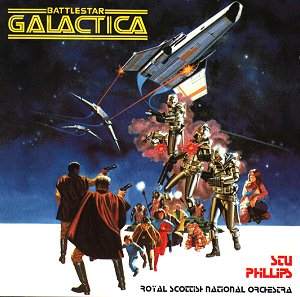
There are successful films, and there are hit movies that inspire a handful or so of imitators, then there are those occasional films that strike such box-office gold as to kick-start an entire cycle. In the 1970's the most notable examples were: The Godfather, The Exorcist, Jaws and Star Wars. Close Encounters of the Third Kind, Superman and Alien were already in various stages of production when Star Wars was released, but they were soon followed by a veritable good, bad and ugly of space opera. Major releases included Star Trek: The Motion Picture, The Black Hole and Flash Gordon, while among the B-movies were Star Crash, The Humanoid and Battle Beyond the Stars. Further still down the cinematic food-chain came Battlestar Galactica, not a real film at all, but the TV Movie pilot to the one Star Wars imitator so derivative George Lucas seriously considered legal action.
Battlestar Galactica was the creation of Glenn A. Larson, who in the 1970's built a successful career producing television series inspired by popular movies: Alias Smith and Jones was Butch Cassidy and the Sundance Kid in all but name, The Dukes of Hazzard was Smokey and The Bandit with new number plates. For television Battlestar Galactica was an enormously lavish and ambitious production, even offering special effects by Star Wars' John Dykstra. With cinema managers hungering to show anything offering a glimpse of a spaceship, Universal re-edited the pilot movie and added the surround-sound process developed for Earthquake to the soundtrack in an attempt to lend the film some spurious excitement. Following Rollercoaster and Midway this proved the fourth and final outing for this forerunner of modern cinema sound systems. Two more Battlestar Galactica features were released, but neither with surround-sound.
While, on a smaller scale, the TV series captured something of the look of Star Wars, it utterly lacked the spirit of adventure which made the Lucas film so exhilarating. The rating quickly plummeted and the very expensive show was cancelled after only one season. Now, in the wake of The Phantom Menace, Mr Larson is, almost inevitably, planning a new Battlestar Galactica, this time as a genuine silver screen blockbuster.
Which brings us to this new album, essentially a remake of the soundtrack album of the pilot film, with the composer himself conducting the Royal Scottish National Orchestra. This orchestra is by now well-versed in dramatic film score recordings, having given us many fine film music recordings including an excellent version of Bernard Herrmann's Vertigo under Joel McNeely three years ago. The sound here is terrific, clear, detailed and with tremendous visceral impact in the action cues, while the playing is energetic and vigorous with the percussion accurate and the brass all but spitting fire. The music, much of which was, according to the notes by Paul Tonks, recycled regularly throughout the series, is cut from a rather Williamsesque cloth. The main theme really is a rousing, memorable affair, while cues such as 'Fighter Launch/Mysterious Derelict/Zac in Trouble' seem to echo both the dark textures of Williams The Fury (1978) and Herrmann's Seventh Voyage of Sinbad (1958). Indeed, in the rather solemn lyricism of the quieter moments 'Sex at Last/ Cassiopea & Starbuck' for example, there is a decided echo of Herrmann. Nevertheless, given the nature of the film I think it is safe to assume that Stu Philips was commissioned to write in this idiom, and that on the whole the influences are assimilated rather well, the overall result being, certainly not a great score, but a rather good one, and certainly far better than the mediocre film/pilot/series ever deserved. If you enjoy muscular, well-crafted action scores in the Williams, Goldsmith, Poledouris vein, you will find Battlestar Galactica a worthy addition to your collection.
Reviewer
Gary S. Dalkin

Revisits:
Collection: Greatest Science Fiction Hits IV Neil Norman and his Cosmic Orchestra
GNP Crescendo GNPD 2258
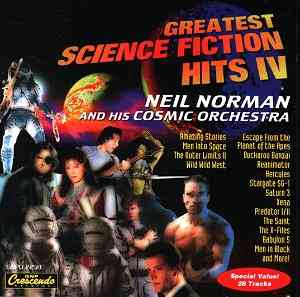
Purists stay well away, Greatest SF Hits IV is the brash sound of a very well connected science fiction fan having irreverent fun. Neil Norman clearly loves this music, yet isn't beyond taking some very radical liberties in his wild reinterpretations, employing orchestra, rock band and assorted soloists. The deliberately tacky front cover leads one to expect the worst, while the range of material is eclectic, the arrangements are delivered with tremendous dynamism and energy. The dinosaur growls over The Lost World cue indicate just how seriously this disc is meant to be taken: in the lavish booklet Neil Norman claims, tongue firmly in cheek, that the album is 'an enduring masterpiece'. Subtle it's not, but it just might go down a storm at the Star Fleet ball.
Reviewer
Gary S. Dalkin

Jay CHATTAWAY Star Trek - The Next Generation OST
GNP Crescendo GNPD 8057
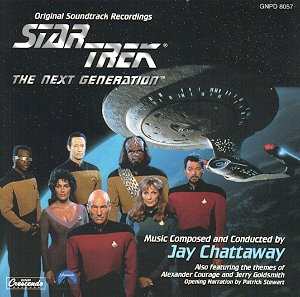
In rather more sober mood than above, Neil Norman acts as Executive Producer for Jay Chattaway's album presenting music from seven episodes of Star Trek: The Next Generation. One highlight is an arrangement of a theme for piano and tin whistle from 'The Inner Light', while 'Sub Rosa' has a lugubrious grace and 'A Fistful of Datas' offers an amusing "Spaghetti Western" pastiche. Much of the remainder is undistinguished, while the sound suffers some varying levels of hiss. The booklet comes with detailed notes explaining the relation of the pieces to the episodes, but this is really an album for committed Star Trek fans, and they will already know it all.
Reviewer
Gary S. Dalkin

Nostalgia/Curio Corner
Erich Wolfgang KORNGOLD Sextet. String Quartet No. 3 The Flesch Quartet; Ian Humphries (viola); David Bucknall (cello)
ASV DCA1062 [59:27]
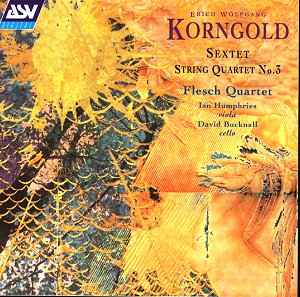
By 1944, Korngold was well settled in Hollywood and began to ponder over the destiny of the music he had composed for Warner Bros. At that time, of course, the music perished when the film left the theatres. Nobody could foresee the popularity these films would gain in their TV reruns or from the pioneering work of conductors, producers and reconstructionsts like, Charles Gerhardt, George Korngold (the composer's son) and Christopher Palmer, in preserving and recording these scores.
So, Korngold began to include themes from his film scores in new works
For the concert hall and the recital room. These works included the Violin Concerto, the Symphony in F-sharp and the Symphonic Serenade - plus this String Quartet No. 3 from 1944.
The String Quartet No. 3 includes themes from Between Two Worlds, The Sea Wolf and Devotion (the theme in turn borrowed from Korngold's music for Shakespeare's Much Ado About Nothing composed in 1918). The string quartet is one of his finest works in the chamber music genre and contains themes of nostalgic regret as well as robust good humour.
The Sextet is an early work written by a very self-assured 17 year old composer. Already the style that would become familiar in the later films is apparent. This is a more Autumnal work of regret and yearning. Some may need to invest some commitment to get the best out of this somewhat dark work but they will be well rewarded. The Flesch quartet, joined by Messrs Humphries and Bucknall for the Sextet play with earnest conviction.
An album for the adventurous film music enthusiast.
Reviewer
Ian Lace

Miklos RÓZSA Complete Works for solo piano Sara Davis Buechner (piano)Yamaha piano recorded New York, March 1998
KOCH INTERNATIONAL 3-7435-2 [71:59]
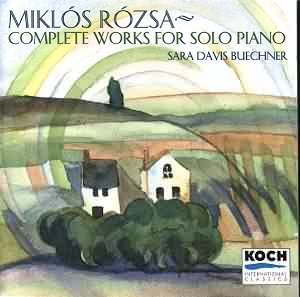
Valse Crépusculaire (1977) 3:54
Variations (1931) 10.52
Bagatelles (1932) 12.17
Kaleidoscope (1947) 9:28
The Vintner's Daughter (1952) 15.17
Piano Sonata (1948) 19.54This is Volume 9 in Koch's splendid series of Rózsa discs.
It is interesting that I was reviewing the Cambria disc four or five months ago and applauding its reissue of the Unicorn LP of Eric Parkin's recordings. This Koch set has the advantage of a much more generous playing time and declares that this is the complete Rózsa piano output.
The stately nostalgic Gallicism of Valse Crépusculaire (not Crépuscalaire as printed in the listing in the book and on the back of the CD) is a serious merit of this disc. It is a dignified and completely memorable offshoot from the Alan Resnais film Providence.
The Variations do not sound all that Hungarian though they are enjoyable. Oddly enough they sound rather Warlockian in this account. The Parkin Bagatelles were not separately banded. These are. My Parkin disc is not easily to hand so I cannot compare head to head. However I am most impressed with Ms Buechner's sorrowingly reflective approach in Bagatelle 1 and Canzone. Valse Lent sounds rather like John Ireland in Amberley Wild Brooks mood.
Kaleidoscope did not feature on the Parkin collection. It is perky, swayingly romantic, playfully Caledonian, dreamy, flouncingly Chinese and impatient. The Vintner's Daughter sequence comprises a theme and twelve variations each banded separately. The variations are a rich cake offering the theme in variety: reserve, skirling, stellar fragile, heroism, Ravelian, graveyard grotesque, macho gruff, dottily jazzy, moaning, moth-flittering, moonlit lakes and hesitantly and supernaturally tranquil.
The Sonata is in three movements here playing 6.36 - 6.34 - 6.43. Buechner starts with a very low octane count for the Calmo but soon warms to the task. The sonata is a subtle of evanescent charm. I am not sure that in this performance Ms Buechner holds a successful key to the enigma. Parkin seems more coherent, with better articulation, sharper focus and communication although in every other respect the Buechner CD is preferred.
Ms Buechner previously recorded as David Buechner. It was under this name that Ms Buechner recorded a Koch disc of film concertos by Herrmann, North and Waxman (KIC7225).
Incidentally is there any reason why Koch consistently muddle 'formally' and 'formerly' in the notes?
The Koch disc has the advantage of having been recorded twenty years after the Parkin Cambria. Certainly the quality of sound on the Koch is a joy to audition.
The notes are by Christopher Palmer and date from 1975. They seem to come from that Breitköpf and Härtel Rózsa paperback monograph published circa 1978. They are very good indeed. What a loss Palmer was to the world of music when he died several years ago. In fact Palmer's notes did not cover the Valse. For this reason there is a note from Ms Buechner. I do hope that we will hear more from Ms Buechner. Is there any chance that she will record the piano music of the neglected British romantic: Roger Sacheverell Coke? She would also be devastating in both sets of the Rachmaninov Etudes Tableaux.
Recommended (with reservation in the case of the Sonata).
Reviewer
Rob Barnett

************************************************************** EDITOR’S RECOMMENDATION– September 1999
**************************************************************
George GERSHWIN - Girl Crazy Lorna Luft, David Carroll and Judy Blazer. Orchestra and ensemble conducted by John Mauceri.
NONESUCH 7559-79437-9 [75:24]
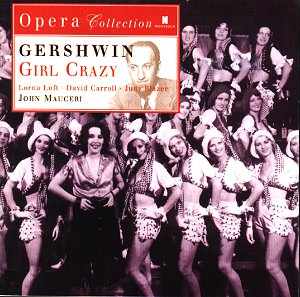
This album is a repackaging of the Roxbury recording released by Nonesuch in 1990. The original packaging include a sumptuous book with a number of fine essays about the show and the Gershwin brothers by such luminaries as Edward Jablonski. If you can find this edition (Nonesuch 7559-79250-2), snap it up. While this new mid-priced reincarnation lacks this extra enticement, its own booklet is still very commendable for it includes a full cast and description of characters plus an essay on the story and the show's production. Then there is a page devoted to Gershwin and his times before the meat of the booklet, the full lyrics of the show's 23 numbers. Finally, because this CD is one of a number of recordings in SONY's opera Collection, there is a useful guide to operatic voice terminology included on the inside back cover. (How Gershwin would have been amused/flattered to have Girl Crazy categorised as opera!)
Girl Crazy was filmed in black and white by MGM in 1943 as a starring vehicle for Judy Garland and Mickey Rooney. Sadly, it was a pale imitation of the original stage show and it dropped many of the numbers.
This recording follows the original Broadway production very faithfully, the orchestra playing in very much the style of the 1930s and the singers also faithfully following the vogue of those days. And what a show Girl Crazy was! One glorious number following on from another in a heady profusion with Ira's stingingly witty lyrics perfectly complementing George's sparkling tunes. 'Biddin My Time'; 'Embraceable You'; 'I got Rhythm'; and 'But Not for Me' - all super hits and still popular today. But the other melodies are also strong. The stirring 'Bronco busters', the torch song 'Sam and Delilah', the comic patter number, Treat Me Rough' and the colourful 'Land of the Gay Caballero' all impress. Mauceri's orchestra whoop it up with gleeful abandon and the lead singers all relish their numbers singing with great élan and expression. Only the greatest number 'But Not For Me' disappoints. Yes, I know it is sad but the delivery here is leaden; the only jarring note in an otherwise top notch production. Nevertheless, I still regard this album as just short of being completely outstanding.
Reviewer
Ian Lace

Return to September index [Part 1] [Part 2] [Part 3]
COMPETITION WIN a CD of your Choice

Search the Crotchet database from here
Discs on these pages are offered for sale. There is also a page of search engines from a selection of on-line retailers here.
Please support this web-site by buying your discs here.
Disclaimer: Every effort is made to make sales links to the correct disc but, in the end, you must take responsibility for checking that what you are purchasing is what you want. Some of these discs were not actually available for sale at the time of posting but a link has been made in anticipation of their forthcoming availablility.
Return To Film Music on the Webe-mail: info@musicweb.uk.net